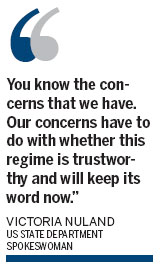Obama to stress security alliance in Seoul visit
Updated: 2012-03-22 08:17
By Zhou Wa (China Daily)
|
||||||||
|
|
The United States will stress the Washington-Seoul security alliance during President Barack Obama's visit to the fortified border on the Korean Peninsula, a White House official has said, as tension aroused by Pyongyang's planned satellite launch tested Washington-Pyongyang ties.
US Deputy National Security Adviser Ben Rhodes confirmed on Tuesday that the US president's first visit to the Demilitarized Zone along the Korean border would take place sometime next week.
The main points of Obama's visit would be to show support for the more than 28,000 US troops serving in the Republic of Korea and to stress the US security alliance with the ROK, said Rhodes.
Cutting the Korean Peninsula roughly in half, the DMZ is heavily armed by both the Democratic People's Republic of Korea and the ROK, with forces from the two countries aligning against one another.
In 2010, 46 ROK sailors were killed by the DPRK's artillery attack on a border island, after the sinking of their warship, the Cheonan, said the ROK.
Following his predecessors, Obama would probably address his country's troops stationed in the DMZ, said Zhang Liangui, an expert on Korean Studies at the Party School of the Communist Party of China Central Committee.
The DPRK would surely verbally fight back over Obama's address, said Zhang.
But the visit would have limited influence over US-DPRK ties and the situation on the Korean Peninsula, he added.
The US needed to put pressure on the DPRK because of the latest tension aroused by Pyongyang's plan to launch a satellite in mid-April, said Chen Qi, an expert on East Asian studies at Tsinghua University.
The DPRK announced last Friday that its Kwangmyongsong-3 satellite carried by the Unha-3 rocket would blast off between April 12 and 16, to mark the 100th anniversary of the birth of DPRK's founder Kim Il-sung.
Pyongyang's announcement aroused criticism from the US and its allies, which are concerned that the DPRK would use the same technology for a long-range missile launch.
China has continued to try to ease the tension created by the DPRK's satellite launch plan.
Chinese Foreign Ministry's Director-General of the Department of Asian Affairs Luo Zhaohui on Tuesday urged all relevant parties to keep calm and stressed that the peace and stability of the DPRK is in all sides' interests.
Meanwhile, the US is working closely with the International Atomic Energy Agency, which confirmed it had received DPRK's invitation to UN nuclear inspectors.
"We are obviously consulting with the IAEA on the right course of action They haven't made any decisions," said US State Department spokeswoman Victoria Nuland.
But she refused to say whether the IAEA would accept Pyongyang's invitation, even though the US is part of the decision-making process at the Vienna-based IAEA.
"You know the concerns that we have," she said. "Our concerns have to do with whether this regime is trustworthy and will keep its word now."
Zhang said that "the IAEA will surely accept Pyongyang's invitation, and the US surely wants to learn about Pyongyang's nuclear development by means of the inspection".
But the IAEA and the US probably won't be able to get any of the results that they expected during the inspection, he added.
zhouwa@chinadaily.com.cn

 Relief reaches isolated village
Relief reaches isolated village
 Rainfall poses new threats to quake-hit region
Rainfall poses new threats to quake-hit region
 Funerals begin for Boston bombing victims
Funerals begin for Boston bombing victims
 Quake takeaway from China's Air Force
Quake takeaway from China's Air Force
 Obama celebrates young inventors at science fair
Obama celebrates young inventors at science fair
 Earth Day marked around the world
Earth Day marked around the world
 Volunteer team helping students find sense of normalcy
Volunteer team helping students find sense of normalcy
 Ethnic groups quick to join rescue efforts
Ethnic groups quick to join rescue efforts
Most Viewed
Editor's Picks

|

|

|

|

|

|
Today's Top News
Health new priority for quake zone
Xi meets US top military officer
Japan's boats driven out of Diaoyu
China mulls online shopping legislation
Bird flu death toll rises to 22
Putin appoints new ambassador to China
Japanese ships blocked from Diaoyu Islands
Inspired by Guan, more Chinese pick up golf
US Weekly

|

|







